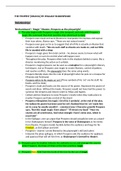THE TEMPEST [DRAMA] BY WILLIAM SHAKESPEARE
‘Relationships’
‘Enchantment’/ ‘Magic’ ‘Illusion, Prospero as the playwright’
1. The play begins with Prospero’s magic (the tempest), and ends with Prospero’s
magic (his command that Ariel send the ship safely back to Italy)
- Prospero uses visual and aural illusions to manipulate his enemies and expose
their true selves. Alonso says, “These are not natural events”
- Prospero even goes so far as to suggest that all of life is actually an illusion that
vanishes with death. “We are such stuff as dreams are made on, and our little
life is rounded with a sleep
- Prospero’s magic gives him total control – he always seems to know what will
happen next, or even to control what will happen next.
- Throughout the play, Prospero often lurks in the shadows behind a scene, like a
director monitoring the action as it unfolds.
- Prospero’s magical powers can be seen as a metaphor for a playwright’s literary
techniques. Just as Prospero uses magic to create illusions, control situations,
and resolve conflicts, the playwright does the same using words.
- Prospero literally steps into the role of playwright when he puts on a masque for
Miranda and Ferdinand
- Prospero refers to his magic as ‘art’ (Three symbols of his ‘art’ are his staff, his
books, and his cloak)
- Prospero’s cloak and books are the source of his power. Represent the power of
words and ideas. Without the books, Prospero would not have had the power to
summon the tempest and restore order to Milan and Naples.
- Caliban advises Stephano to seize Prospero’s books when they make plans to
murder Prospero and take control of the island.
- Prospero relinquishes his magic ( rid of his 3 symbols) at the end of the play.
He realizes his power has been used for evil. Realized that his ‘art’ made him
act in a way he usually wouldn’t – unnatural way ( Character growth) Prospero
says, “But this rough magic I here abjure” “I’ll drown my book” “Now my
charms are all overthrown, And what strength I have’s mine own, which is
most faint”
- In the Epilogue, one can argue that Prospero should actually be seen as a stand-
in for Shakespeare himself. Prospero is the voice of Shakespeare as he retires
from theatre. Prospero stands humbly before the audience and begs for his
freedom, as did Caliban and Ariel
- Prospero’s ‘charms’ can be likened to the playwright’s skill and talent
- Interpret the plays epilogue, in which Prospero asks the audience for applause
and approval that will set him free, as Shakespeare’s farewell to theatre.
2. Prospero gave his brother Antonio the authority to run and manage the country
while Prospero, the Duke of Milan at the time practices magic
3. Prospero frees Ariel from the trunk of the tree by the use of magic
, - Ariel was trapped in the tree by Sycorax. Sycorax had imprisoned Ariel in a pine
tree. Ariel was consigned to the tree because he refused to do her bidding. (not
following her commands)
- Prospero released him from one for of bondage by immediately placed him in
another.
4. Prospero’s enchantment that causes the Tempest. An illusion that causes his
enemies to be shipwrecked on the island. Ariel raises a storm to stand the boat with
King Alonso, Ferdinand, Antonio, and Sebastian by the use of magic.
- The tempest represents the political upheaval in the play
- When the courtiers and their ship are tossed by the storm, nature and the sailors
suddenly have more power than the courtiers. Ariel says he heard one of them say,
“Hell is empty and all the devils are here”
- This state of disorder continues throughout the play until the injustice done to
Prospero is righted at the end.
- After Prospero has regained his dukedom, he promises his guests ‘calm seas ‘and
favourable winds for their journey home.
5. Ariel enters and puts all the men to sleep with his music, expect for Sebastian and
Antonio allows for the truth to come out.
- Ariel uses music to enchant
- Antonio and Sebastian’s plot to overthrow Alonso. They conspire to kill Alonso so
that Sebastian can become king.
- Antonio reminds Sebastian of how he betrayed his own brother and now lives a
better life for it.
- Sebastian is easily persuaded to murder his brother and shows as little
conscience as Antonio
- Ariel intervenes and wakes Gonzalo and Alonso before they are killed
6. Prospero’s enchants the noblemen, Caliban, Stephano, and Trinculo through Ariel in
order for his plans to happen and for his enemies to be within his grasp
- Solemn and strange music, Spirits set up a banquet table laden with food
- Ariel enters disguised as a harpy to remind them of their sins – represents the
justice that Prospero has been seeking since he arrived on the island 12 years
before. Prospero says, “at my mercy all mine enemies”
- Alonso, Antonio, and Sebastian are the only ones who had seen the Harpy,
Gonzalo did not – because he helped Prospero when he was exiled, gave him his
books.
- Alonso repent his sins and vows to join his dead son in the depths of the ocean
- Fear from banquet – illusion but it was real for them
- Ariel causes discord among the three, resulting in a fight between Stephano
(butler) and Trinculo (jester) by speaking in Trinculo’s voice. Ariel says, “Thou
liest”
- Ariel leads Caliban, Trinculo and Stephano using a tune on a tabor and pipe to
where Prospero wants them. Caliban says, “This isle is full of noises.”
- Trinculo says “Forgive me my sins” when Ariel starts playing the tune – he is
afraid (Uttered as a prayer before death)




